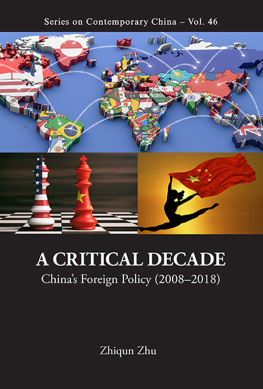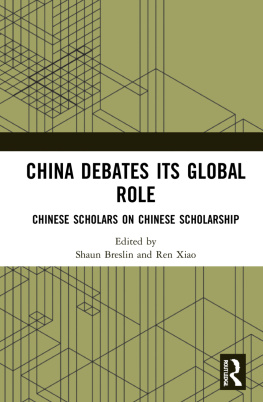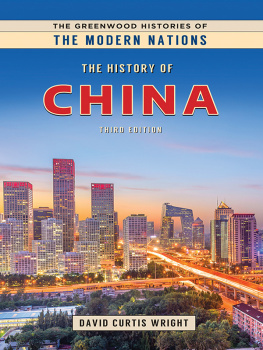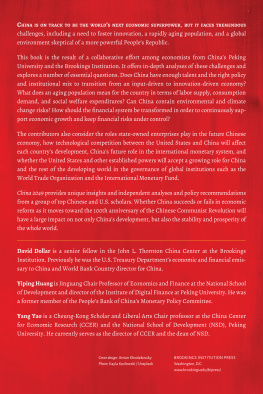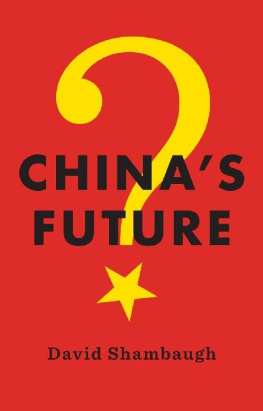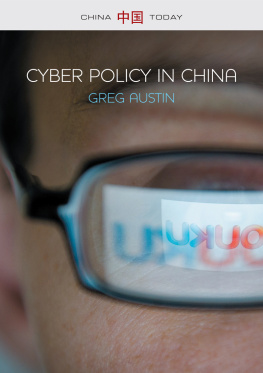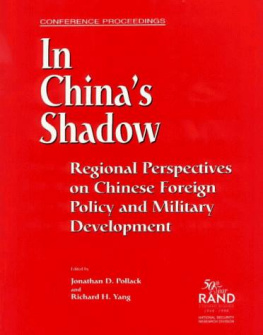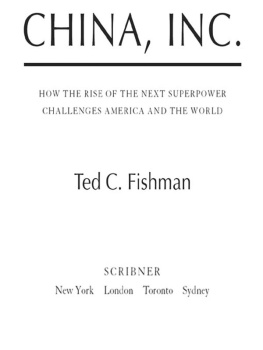CHINA
QUESTIONS
CRITICAL INSIGHTS INTO A RISING POWER
Edited by
Jennifer Rudolph
Michael Szonyi


Cambridge, Massachusetts
London, England
2018
Copyright 2018 by the President and Fellows of Harvard College
All rights reserved
Jacket design: Graciela Galup
978-0-674-97940-6 (cloth : alk. paper)
978-0-674-98333-5 (EPUB)
978-0-674-98334-2 (MOBI)
978-0-674-98270-3 (PDF)
The Library of Congress has cataloged the printed edition as follows:
Names: Rudolph, Jennifer M., editor. | Szonyi, Michael, editor. | Fairbank Center for East Asian Research.
Title: The China questions : critical insights into a rising power / edited by Jennifer Rudolph and Michael Szonyi.
Description: Cambridge, Massachusetts : Harvard University Press, 2018. | Includes index. | In celebration of the 60th anniversary of the Fairbank Center for Chinese Studies at Harvard UniversityTitle page verso.
Identifiers: LCCN 2017023762
Subjects: LCSH: ChinaForecasting. | ChinaPolitics and government2002 | ChinaForeign relations21st century. | ChinaEconomic conditions2000 | Environmental policyChina. | ChinaSocial conditions2000 | ChinaCivilization2002
Classification: LCC DS779.4 .C463 2018 | DDC 951.06dc23
LC record available at https://lccn.loc.gov/2017023762
In celebration of the 60th anniversary of the Fairbank Center for Chinese Studies at Harvard University
CONTENTS
- ELIZABETH J. PERRY
- JOSEPH FEWSMITH
- RODERICK MACFARQUHAR
- MARK ELLIOTT
- YA-WEN LEI
- ARUNABH GHOSH
- YUHUA WANG
- ODD ARNE WESTAD
- ANDREW S. ERICKSON
- ROBERT S. ROSS
- ALASTAIR IAIN JOHNSTON
- STEVEN M. GOLDSTEIN
- EZRA F. VOGEL
- RICHARD N. COOPER
- DWIGHT H. PERKINS
- MEG RITHMIRE
- MARK WU
- TONY SAICH
- NARA DILLON
- MICHAEL B. MCELROY
- KAREN THORNBER
- SUSAN GREENHALGH
- ARTHUR KLEINMAN
- JAMES ROBSON
- LEONARD W. J. VAN DER KUIJP
- WILLIAM P. ALFORD
- WILLIAM C. KIRBY
- MICHAEL PUETT
- ROWAN FLAD
- PETER K. BOL
- WAI-YEE LI
- DAVID DER-WEI WANG
- JIE LI
- XIAOFEI TIAN
- STEPHEN OWEN
- PAUL A. COHEN
I F YOUVE picked up this book, you have probably already accepted the premise that China matters, and therefore that understanding China matters. In a certain obvious sense, China has always mattered and always will. What happens to a fifth of the planets population is important. But today China matters not only to the Chinese people themselves but also to Americans and to the entire world in some new, unexpected, and interesting waysand not only because of Chinas large and growing role in the world economy. Of the many pressing problems facing our worldfrom climate change to economic growth to maritime security to counterterrorismnone can be solved or even addressed effectively without Chinas participation. It is this reality, and not simple trade volumes, that makes the relationship between the United States and China the most important bilateral relationship of the twenty-first century.
Another new and mostly unexpected way in which China matters is that, for better or worse, Chinese policies increasingly have an impact beyond Chinas borders. Whether through its Belt and Road Initiative or by its contribution to the depletion of global fisheries, the actions of Chinas government and its people affect all of us. China is also playing a new role in the global marketplace of ideas. In areas as diverse as approaches to economic development and poverty reduction, to aging and mental health, to pollution reduction and renewable energy sources, it just makes good sense to pay attention to some of its ideas. This is not to say that we should embrace every aspect of the ways that the Peoples Republic of China (PRC) does things. Many Americans have profound objections to aspects of Chinas government and politics (and so, for that matter, do many Chinese). Nonetheless, it is still better to know more about the Chinese positions on these issues rather than less.
Because China matters, understanding China matters. In a certain obvious sense, understanding China has never been easier. The amount of information about China to which Americans have access is growing almost as explosively as the countrys economy. Americans travel to China in record numbers. More and more are even studying the Chinese language (though nothing like the numbers of Chinese who study English). All leading global media have a presence in China, which means that when China is in the headlines, as it is almost daily, it is often world-class journalists who are telling the story. But even the very best and most neutral mainstream journalism is mostly driven, as it ought to be, by the news of the day. It tends to focus on what is most visible or striking; journalists cannot be expected to have deep knowledge of every story they cover. More and more of our information about China comes from Chinese people themselves, who are writing and publishing in English in greater volume and frequency. But just because they are insiders does not necessarily mean they understand the situation in China better. Americans today also have access to information about China through Chinas own state-owned media, which embarked several years ago on an aggressive global expansion. Their representation of China, unsurprisingly, has its own agenda, as positive about China as some US media is negative. Thus despite the increase in the amount of information available about China, it is still tough to make sense of it all. We might even say that just as the United States has a trade deficit with China, it also has an understanding deficit.
That is why we have put together this book. We invited thirty-six scholars to identify a big question that they think Americans should ask about the past, present, or future of China. And then we invited them to answer that question. Each of the authors is an expert who writes with the benefit of decades of exploring and analyzing these big questions. They have thought deeply about their question, and about how to summarize pressing issues while still recognizing complexity.
The chapters as a whole have a few key messages about Chinas past, present, and future. The key message about the past is that history matters; about the present, that complexity matters, and about the future, that Chinas challenges matter.
PAST
Is the China of today completely new, or does the past still play a role? One could easily make the argument that history does not matter in contemporary China, that the extraordinary transformations of the last forty years mean that China is all about the future, or that the retreat of the Chinese Communist Party (CCP) from ideological commitment means that what matters in China is the future, not the past. This conclusion would be premature.
For one thing, it is not that long ago that China tried and failed to eliminate its history in the Great Proletarian Cultural Revolution and other mass movements of the Maoist era. Xiaofei Tian writes in this volume of the paradox of the [Cultural Revolutions] pledge to demolish the past and create a new society, even though the movement was itself deeply embedded in the past. Many of the chapters argue the importance of history on this or some other grounds. It is simply impossible to understand why the Chinese people feel so strongly about visits by Japanese leaders to the Yasakuni shrine, or about the Taiwan independence movement, without an understanding of the history behind these matters.


